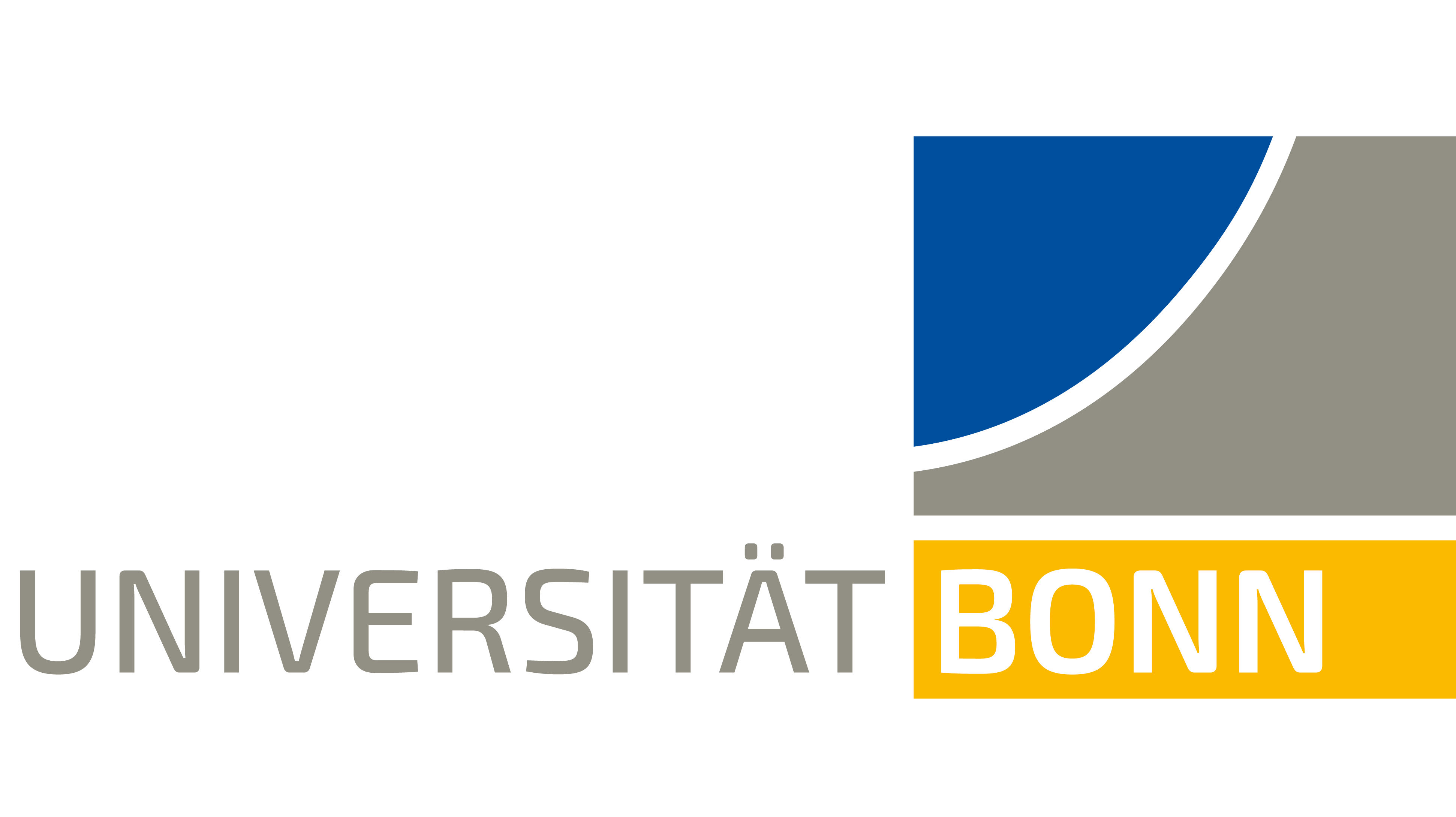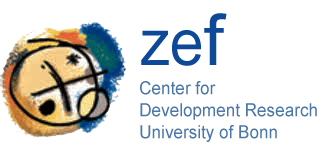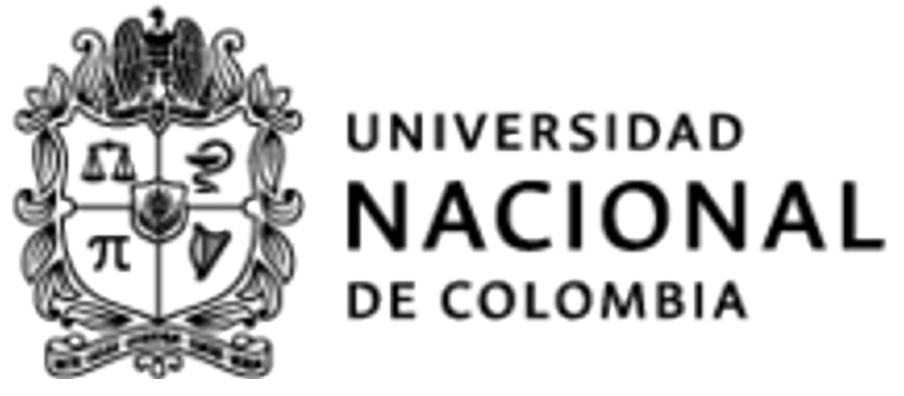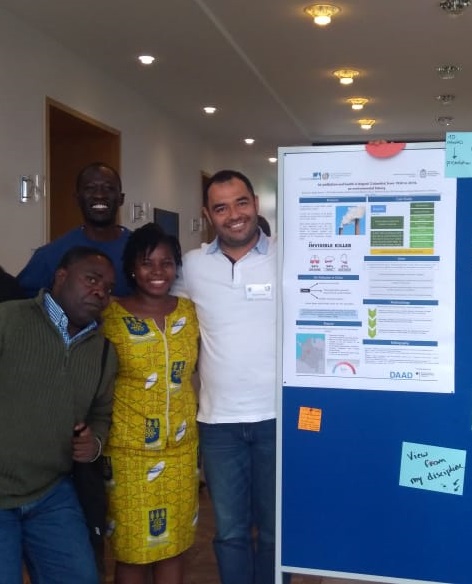 |
 |
 |
 |


Participation in conferences
The DSSP has supported the participation of IDEA’s academic community in national and international scientific events. The following are the events and the works presented by the beneficiaries of the program during 2018.
National
- “Contributions of agroecological practices to peace building in Colombia”
Ingrid Quintero, Juliana Sabogal Aguilar and Julián Vivas García.
Internactional
- “Conflict due to biomass and oil palm in the Community Councils of Jiguamiandó and Curvaradó (Chocó, Colombia)”
Karem Acero - "Conflict due to the environmental effects of sea level rise in Isla Múcura (Colombia)”
Karem Acero and José Javier Toro - “Urban metabolism and entropy in the main capital cities of Latin America”
Cristian Julián Diaz Álvarez - “The plurality of values in ecosystem services: challenges, scope and prospects”.
Carmenza Castiblanco Rozo & Diana Milena Lara - “Analysis of Payment for Environmental Services (PES) schemes applied to the natural pollination service in a promising crop in the Department of Huila, Colombia”.
Laura Victoria Calderón Acero & Carmenza Castiblanco Rozo - "Socio-cultural assessment of Ecosystem Services: Marine Reserve Prainha do Canto Verde (Brazil)"
Diana Alexandra Tovar & Jeovah Meireles
Participation in national conferences
-
“Contributions of agroecological practices to peace building in Colombia”
Ingrid Quintero, Juliana Sabogal Aguilar and Julián Vivas García.
Presented at the VI Agroecology International Seminar, X National Agroecology Simposium, and the VIII Exchange Fair of Agroecology Experiences. City of Pasto (Nariño, Colombia, October 8 to 12).


Abstract:
Agroecological practices have been traditionally defined as the techniques and procedures aiming at adding value to the processes and functions occurring naturally in ecosystems, in order to enhance and reproduce their effects during agricultural production. However, these practices also imply alternative ways of “know-how” entailing cultural, political and economic aspects, related with cornerstone elements of the rural life: the creation and strengthening of social networks, collaboration, sharing knowledge and experiences, and carrying out economically feasible activities. This lecture discusses the concept of “agroecological practices” from different theoretical perspectives and reflects on their role within the Peace Agreement (2016) and its main objective: a long lasting and stable peace.
Participation in international conferences
-
“Conflict due to biomass and oil palm in the Community Councils of Jiguamiandó and Curvaradó (Chocó, Colombia)”
Karem Acero.
Presented at the III Latin American Congress on Environmental Conflicts (COLCA-2018), city of Boca del Río (Veracruz, México), October 1 to 5,


Abstract:
The Génesis and Cacarica military operations (1997) by the Colombian National Army (in association with paramilitary structures to fight the FARC-EP guerrilla groups) led to the forced displacement of hundreds of people. After this event, oil palm crops appeared in Curvaradó and Jiguamiandó, traditional territories of afro-Colombian communities. Companies such as Urapalma grabbed the land at low cost by using coercive methods. This trend was followed by other eight companies that illegally acquired traditional lands with high ecological value. The Inter-American Commission on Human Rights and the Colombian Constitutional Court took a stance due to this case and ordered the restitution of land to the Community Councils of Curvaradó and Jiguamiandó, whose members face life threats.The objective of this work was analyzing, through the methodology proposed by the Observatory of Environmental Conflicts (OCA), the role of the different actors involved in the conflict and ecosystem impacts of oil palm crops in the Community Councils of Curvaradó and Jiguamiandó. Results show that the struggle by displaced populations begins with the attempts to return to their lands, which ended up being covered by oil palm crops and guarded by paramilitary groups. Therefore, the population was grouped into eight Humanitarian Zones whose objective was protecting the life of afro-Colombian people. Some peasants, in order to exercise their sovereignty over their territory, cultivate subsistence crops in the lands invaded by oil palm. This monocrop fragmented the rain forest of the Darien zone, transformed ecosystems and caused biodiversity loss. Crops contributing to agro-biodiversity (such as rice, yucca, plantain and corn) were replaced by oil palm. The companies have changed the course of rivers to irrigate these crops, thus transforming the landscape. Forced displacement, murder of social leaders, eviction and dispossession of afro-Colombian lands were some of the consequences of this process. Additionally, the culture setting was harmed and the population was divided into two: those who struggle to recover collective lands, and those who defend oil palm companies because of the job opportunities they provide.
-
“Conflict due to the environmental effects of sea level rise in Isla Múcura (Colombia)”
Karem Acero and José Javier Toro.
Presented at the III Latin American Congress on Environmental Conflicts (COLCA-2018), city of Boca del Río (Veracruz, México), October 1 to 5.
Resumen:
Climate change alters the environment and the resulting effects are exacerbated by anthropic activities, which affect human life in the medium and long term. One of this effects is the rise of the sea level that led to the creation of the category ‘environmental refugee’ due to phenomena like tsunamis.Sea level rise in Colombia has caused the disappearance of two islands in the Corales de Rosario and San Bernardo Natural Park, a protected area since 1979 but invaded by different communities. Isla Múcura is located there, and it is a territory characterized by armed conflict, narcotrafficking, disputes over land and invasion of tourism infrastructure (privatization). The Community Council of this island is seriously affected by these factors, in addition to the erosion caused by the rise of the sea level.
The objective of this research is analyzing the environmental effects of this phenomenon. A social and environmental diagnosis of the island was carried out through secondary information. This was complemented by primary information (interviews, social cartography and a Digital Elevation Model). Results revealed which areas of the island have disappeared and how this situation generates territorial disputes between the Community Council and tourist complexes.
-
“Urban metabolism and entropy in the main capital cities of Latin America”
Cristian Julián Diaz Álvarez

Presented at the 15th Summer Institute of the Pacific Regional Science Conference Organization (PRSCO) at the Pontificia Universidad Católica del Perú in the city of Lima. July 4 to 6.
Abstract:
As complex systems, capital cities in South America have lived a sort-of urban adventure, defined by the initial conditions of their foundation and the background of native indigenous populations. The evolution through great periods of time (the Colony, the Republic, the XX Century City and the Extended Metropolis) has also shaped the dynamics of those cities. This historical process has consolidated these capitals as nodes of capital, wealth and –paradoxical- poverty, as well as nodes of local, regional and global connectivity. This has required a significant energetic demand to maintain pseudo-stable statuses in conditions away from equilibrium.
This thermodynamic achievement is based in a continuous and growing flow of materials and energy –within a changing and diverse economic, social, political and natural context- that is progressively producing larger amounts of entropy, reflected in the pollution in air, water, soil and biota. This reality of the urban structure in the current non-equilibrium conditions can be represented from the perspective of the sciences of complexity and ecological economics, specifically from the concept of urban metabolism and entropy.
A comparative study of urban metabolism was carried out between the cities of Bogotá, Lima, Santiago de Chile and Buenos Aires for the years 2000, 2010 and 2015, regarding the consumption of water, energy (fuel and electricity) and food, as inputs to the system. The generated entropy (discharges, emissions and solid waste) was also analyzed.
This regional Latin American study shows that capital cities in emerging economies –aside from their cultural and geographical differences- share a similar metabolic factor that is observed in a growing aggregate consumption and a natural increase in entropy. This urban unsustainability is exacerbated by the neoliberal policies of indefinite growth, but is outshined by the availability of capital and the dominant technocratic optimism.
-
“The plurality of values in ecosystem services: challenges, scope and prospects”.
Carmenza Castiblanco Rozo & Diana Milena Lara


Presented at the 15th Conference of the International Society of Ecological Economics in the city of Puebla, México, September 10 to 12.
Abstract:
The presentation highlights the importance of the socio-ecosystemic approach and participatory methodologies for the understanding of socio-environmental conflicts of Colombia's interior wetlands and their ecosystem services. The analysis is carried out based on a comprehensive analysis strategy that includes elements of that approach as focal points of interpretation. In this sense, conflicts between human activities and the sustainability of wetlands are a focal point of the discussion. The analysis of three study areas that represent the complexity of the urban, protected and rural context (Jaboque wetland, El Yulo and Orotoy micro-basin) is carried out, through a social assessment (using the Q methodology), the analysis of trade-offs and conflicts for each study area. Results show the similarities of the problems of the analyzed wetlands and the importance of the role of the community and public entities in their protection. This is a national overview of the challenges and opportunities at several levels: management of the wetlands' diversity, decision-making and policy design, thus pointing out the wetlands' importance for risk management and climate change strategies. The Q methodology is presented as an important approach that takes into account the plurality of values with respect to ecosystem services, which is useful for decision-making.
-
“Analysis of Payment for Environmental Services (PES) schemes applied to the natural pollination service in a promising crop in the Department of Huila, Colombia”.
Laura Victoria Calderón Acero & Carmenza Castiblanco Rozo.


Presented at the 15th Conference of the International Society for Ecological Economics in the city of Puebla, México, September 10t to 12.
Abstract:
The main objective was to analyze the potentialities and limitations of a PES-like economic instrument for the conservation of the natural pollination service in crops. This was addressed through the following specific objectives: first, identifying the main agroecological, institutional and economic elements that are relevant for the eventual design of a payment scheme for the conservation of natural pollination associated with crops. Second, gathering the perceptions by farmers regarding the real possibilities of adoption of a payment scheme for the natural pollination service in crops of cholupa (Passiflora maliformis).The study was carried out in the municipality of Rivera, Huila (southwestern Colombia). 15 farms producing cholupa (P. maliformis) were thoroughly characterized in the most important ecosystem and cultural aspects, based on the estimation of the Main Agroecological Structure (MAS) (León-Sicard, 2014). This indicator allowed establishing critical management practices to define the additionally of the particular pollination service in crops and its relationship with the main elements of PES-like schemes. On the other hand, the motivations and perceptions of cholupa producers in the region and the possibilities of success or failure of this type of economic incentives to conservation were identified (through semi-structured interviews).
Critical variables for the management of native pollinators within the crop, weed management practices, pest control and the connection with the MAS were identified as critical variables. Although producers in the region have extensive knowledge and concern for wild bees and the role they play in their crops, the results evidence that an incentive for conservation is necessary to drive a change specifically aimed at the conservation of this ecosystem service. However, several characteristic elements of the PES do not comply with the ecosystem particularities of pollination.
-
"Socio-cultural assessment of Ecosystem Services: Marine Reserve Prainha do Canto Verde (Brazil)" ”.
Diana Alexandra Tovar & Jeovah Meireles.

Presented at the 15th Conference of the International Society for Ecological Economics in the city of Puebla, México, September 10 to 12.
Abstract:
The concept of Ecosystem Services (ES) strengthens the link between ecosystems and society; however, it is not exempt from criticism, like having a fuzzy definition and the tendency to overestimate monetary valuation (Schroter et al., 2014; Pascual et al., 2017). In order to contribute to this debate, the present study carries out a socio-cultural assessment of SE in the Marine Extractives Reserve - RESEX Prainha do Canto Verde (Ceará, Brazil), a complex and dynamic geo-system in the coastal plain of northeast Brazil, whose community is recognized for the struggle to protect their territory.Social cartography, as a tool to identify ES, allowed us to enrich the ecosystem view with geomorphological, spatial, and territorial aspects. The socio-cultural assessment follows the Pebble Distribution Method (PDM) (Moreno - Sanchez et al., 2013) with focus groups, which implies a holistic view of the socio-ecological system and recognizes the incommensurability of environmental values. In this sense, the preferences of the community, far from monetary values, were captured in a relative and collective way.
The assessment of social and cultural aspects of marine fisheries is important for incorporating the social dimension and cultural values into public policies, and for a comprehensive accounting of the ecosystems’ contributions to human well-being (Urquhart et al., 2013; Plieninger et al., 2013; Queiroz et al., 2017). In conclusion, the research demonstrates the relevance of cultural services, values and traditional options, key factors to face existing socio-environmental conflicts and support the struggle to protect the territory of Prainha do Canto Verde.


